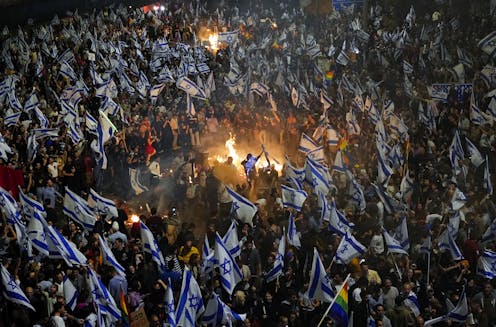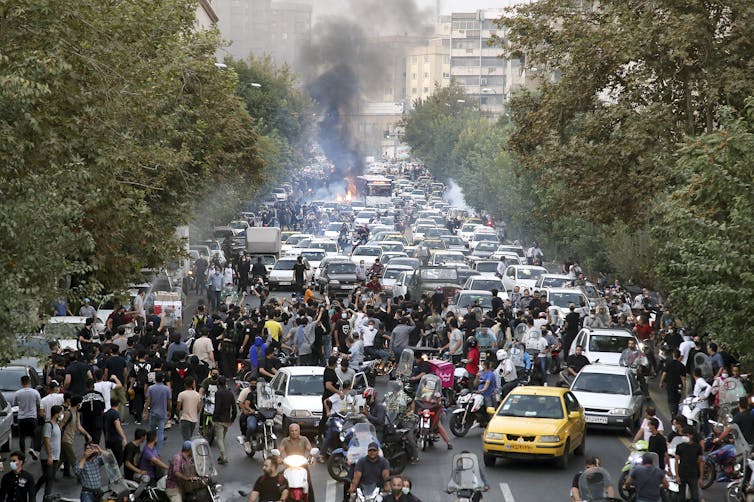
In late 2022, Israeli Prime Minister Benjamin Netanyahu won Israel’s fifth election in the past three years by forming a coalition with far-right religious extremists whose ilk were previously considered beyond the pale in Israeli politics.
Netanyahu’s coalition recently introduced legislation to overhaul Israel’s Supreme Court, aiming to eliminate the court’s ability to impose democratic checks on elected leaders.
The overhaul, which would also protect Netanyahu from pending corruption charges, provoked an unprecedented wave of anti-government protests across Israel that have shaken the country’s political and economic foundations.
The protests included threats by combat personnel from Israel’s air force and special forces units to boycott their reserve duty.
Defense minister reinstated
In response, Netanyahu temporarily shelved the legislation, candidly admitting that he wished to avoid “civil war.”
Netanyahu also reinstated Defense Minister Yoav Gallant, whom he had fired for publicly calling on him to end the judicial overhaul because the internal divisions it caused made Israel vulnerable to external threats.
On one level, the widespread protests against governmental overreach represent an indicator of Israeli democracy’s robustness. But as a country that considers itself beset by external enemies, Israel has only a slim margin for internal division. The gulf between the protesters and Netanyahu’s coalition reflect the deepening fault line between secular and religious Jews.
And despite Netanyahu’s backtracking, Israel’s ability to deter its enemies has already been weakened by wounds that are self-inflicted.
Ramadan attacks
In early April 2023, during the holy month of Ramadan, Israeli police raided Jerusalem’s Al-Aqsa Mosque, the third holiest site in Islam. The site has been under Israeli control since 1967 and has increasingly become a place of resistance to Israel’s occupation of Palestinian territories.
Israeli forces were caught on camera using brutal force to subdue worshippers in a video that quickly went viral globally.

Islamist militant group Hamas responded by firing a barrage of rockets at Israel from Gaza. Another was fired from Lebanon, where Hamas has a foothold under the patronage of Hezbollah, the strongest of Iran’s various proxy militias across the Middle East.
Read more: Why Hezbollah matters so much in a turbulent Middle East
When militant attacks then killed several civilians inside Israel and the Israeli-occupied West Bank, Hamas called this a “natural response” to Israeli forces’ actions at Al-Aqsa.
This was followed by another barrage of rockets fired at Israel from Syria, where Iran, Hezbollah and other Iranian-aligned militias all have forces deployed near the Israeli-occupied Golan Heights.
Self-inflicted wounds
These rocket salvos caused minimal casualties. Many rockets were shot down by Israeli air defences, and Israel then launched retaliatory strikes.
Yet the rockets nevertheless caught Israel’s political and defence establishment off-balance. Afterward, a former chief of Israel’s military intelligence branch warned that the damage inflicted to Israel’s national security by Netanyahu’s judicial overhaul might be “irreversible.”
Another former senior defence official said Israel’s enemies are “rubbing their eyes in disbelief” about the domestic turmoil and wondering whether the country “has decided to die by suicide.”
During a special Ramadan address, Iranian Supreme Leader Ayatollah Ali Khamenei exulted in the alarm of Israeli political elites over Netanyahu’s overhaul, noting that Israel’s “own officials continuously warn that their collapse is nearing.” Khamenei concluded that Israel’s demise was unfolding even faster than he had anticipated.
In recent years, Khamenei’s Islamic Revolutionary regime has itself been rocked by widespread anti-government protests, raising questions about its own survival.

Testing Israeli defences
But after weathering the protests and a United States-led economic boycott, the Iranian regime’s fortunes appear to have turned.
Iran has won its bet in Syria. Its military intervention alongside Russia has kept Bashar al-Assad’s regime in power, keeping open a conduit for weapons transfers to Hezbollah in Lebanon.
Meanwhile, Iran’s recent renewal of diplomatic ties with Saudi Arabia, brokered by China, has crippled Saudi Arabia’s young alliance with Israel while eclipsing U.S. influence in the Middle East.
This has emboldened Iran to test Israel’s internal cohesion and resolve. Hamas’s deployment in Lebanon and its ability to fire rockets from Lebanese soil, along with rocket fire from Gaza and Syria, shows Iran’s assorted proxy forces are testing Israel’s defences.
The far-right swing in Israeli politics is inseparable from Israel’s police brutality at Al-Aqsa. Amid its ongoing occupation of Palestinian territories, the worsening tensions between Israel’s secular and religious Jewish blocs have blown wide open.
Meanwhile, as Netanyahu’s coalition injects virulent extremism into Israel’s political mainstream, a reprise of the deadly violence between Arab and Jewish citizens that exploded across Israel in May 2021 seems inevitable.
Israel’s current internal tumult is far greater than at any other moment in its history. As many Israeli analysts have already noted, this raises serious questions about the country’s long-term survival.
Daniel L. Douek does not work for, consult, own shares in or receive funding from any company or organisation that would benefit from this article, and has disclosed no relevant affiliations beyond their academic appointment.
This article was originally published on The Conversation. Read the original article.







